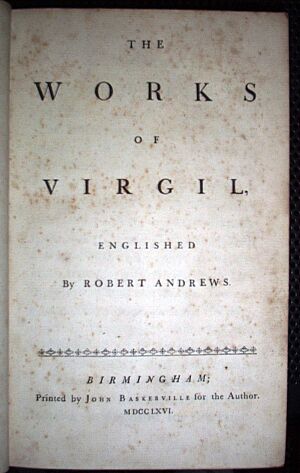Robert Andrews (translator) facts for kids
Quick facts for kids
Robert Andrews
|
|
|---|---|
| Born | 1723 |
| Died | 1766 (aged 42–43) |
| Occupation | Clergyman, poet, translator |
| Nationality | British |
| Period | 1752–1766 |
| Notable works | The Works of Virgil, Englished Eidyllia, or, Miscellaneous poems |
| Spouse | Hannah Hazlewood |
Robert Andrews (born 1723, died 1766) was a British writer. He was known for his poems. He also translated the famous Roman poet Virgil's works. Andrews was an English Dissenter, meaning he was a Protestant who did not follow the official Church of England.
Contents
Robert Andrews's Life
Andrews was born in 1723. His father was Robert Andrews, and his mother was Hannah Crompton. His family was well-known for being Dissenters. They had lived in areas like Little Lever and Rivington Hall in Lancashire for nearly 200 years.
His Education and Early Career
Robert Andrews studied to become a minister. He attended a special school called a Dissenting academy. This school was run by Dr. Caleb Rotheram in Kendal. After finishing his studies, he became a minister. In 1747, he started leading a Presbyterian church. This church was located in Lydgate, Yorkshire.
Around 1753, he moved to Platt Chapel in Rusholme, Lancashire. This was another church for Protestant Dissenters. He stayed there for about three years. In 1756, he moved again to Bridgnorth. There, he led another Presbyterian church.
His Family and Later Years
Robert Andrews married Hannah Haslewood. They did not have any children. Sadly, his health became very poor. He became ill before he passed away in 1766.
Robert Andrews's Writings
Andrews wrote several important works during his life. Early in his career, he wrote some reviews of other authors' works. He also wrote a book of poems. This book was called Eidyllia. It was published in 1757. In the introduction to this book, he argued against using rhyme in poetry.
His Famous Translation of Virgil
The most famous work by Robert Andrews was his translation of Virgil. It was called Virgil Englished. This book was published in 1766, the same year he died. A very famous printer named John Baskerville printed the book. Baskerville was known for his beautiful printing.
Andrews dedicated his translation to Booth Grey. Booth Grey later became a Member of Parliament for Leicester. Andrews translated Virgil's work using blank verse. This means the poetry did not rhyme. He tried to translate each line of Virgil's original work directly.
People have described his translation in different ways. Some called it "unreadable" or "eccentric." Others said it was "monumental and austere." When it was first published, important magazines reviewed it. These included The Critical Review and the Monthly Review.
In his introduction to the book, Andrews explained why he used blank verse. He also praised Virgil as a "defender of liberty." Andrews believed Virgil's writings inspired a spirit of freedom. He felt this freedom was best found under the rule of the British King and Parliament. Today, you can still find his work. It is available as a Print on demand book.
Other Works
In 1766, John Baskerville also reprinted Andrews's Odes. This was another collection of poems. It was also dedicated to Charles Yorke. This book is very rare today. Only a few copies are known to exist in libraries around the world.
 | Misty Copeland |
 | Raven Wilkinson |
 | Debra Austin |
 | Aesha Ash |


